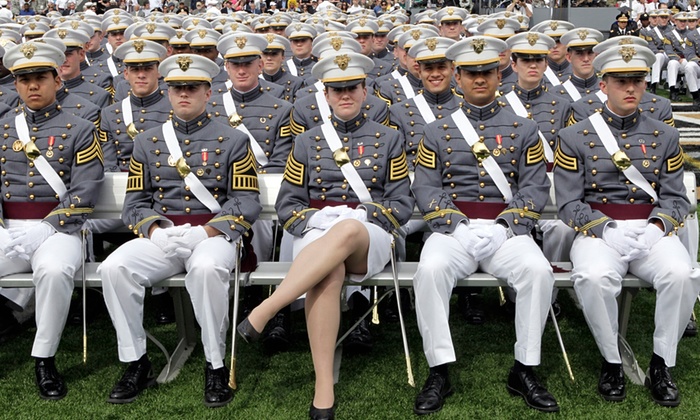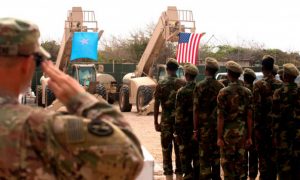
Muqdisho, 3 September 2015 – A law professor who published an inflammatory article urging attacks on law professors and “Islamic holy sites” and who has been dogged by accusations of misrepresenting his academic and military credentials has resigned from the US Military Academy at West Point, the Guardian has confirmed.
Although West Point hired William C Bradford on 1 August, a spokesman said the prestigious undergraduate institution where the US army educates its future officers parted ways with the controversial academic on Sunday, the day after the Guardian published an article highlighting Bradford’s proposals to treat US scholars as “enemy combatants”.
“Dr William Bradford resigned on Sunday,” army lieutenant colonel Christopher Kasker, a West Point spokesman, told the Guardian on Monday. Bradford had taught five lessons for cadets in a common-core law course, from 17 to 27 August.
The West Point resignation marks the most recent academic departure for the controversial Bradford, following a decade’s worth of apparent exaggeration of his service record and academic career.
It remains unclear how thoroughly West Point vetted Bradford before hiring him.
Bradford recently published an academic article titled, in translation, “The Treason of the Professors”. The lengthy paper, which has been repudiated by its journal editor as a “mistake”, accused a “clique of about 40” law professors of active collaboration with “Islamist” organizations and recommended targeting them as enemy combatants.
Supplementing military action, Bradford recommended that Congress investigate links between the professors and “Islamism” under “a renewed version of the House Un-American Activities Committee”, which was one of the vehicles for the discredited “Red Scare” hunts for Communists in the 1950s.
“Treason prosecutions shore up national unity, deter disloyalty, and reflect the seriousness with which the nation regards betrayal in war,” Bradford wrote.
Bradford went on to argue that “total war” against terrorism ought to include military targeting of “Islamic holy sites”, in order to restore an American deterrent. He acknowledged “great destruction, innumerable enemy casualties and civilian collateral damage” were entailed in his proposal, and suggested that dissent ought to be curbed.
“[D]oubts and disputes about this war [should] be muted lest around them coalesce a new set of self-imposed restraints that prevent Western forces from waging war with sufficient ferocity and resolve so that either Islamism is discredited and the political will of Islamist peoples to prosecute a jihad collapses, or, if necessary, all who countenance or condone Islamism are dead,” Bradford wrote.
On Friday, Kasker, the West Point spokesman, distanced the academy from Bradford’s article. Bradford’s picture has been removed from the West Point law department website.
Bradford had represented himself in academic papers as an “assistant professor” at the Defense Department-run National Defense University. But he was not a professor there, nor even a staff employee, according to NDU representatives. He is said to have worked for a Waynesboro, Virginia-based translations and business consultant, Translang, which had a contract with the university.
Before referring further comment to an attorney, Beatrice Boutros, Translang’s president, told the Guardian Bradford was not an employee of NDU.
Bradford has had a checkered academic career. In 2004, he quit a job teaching at the Indiana University School of Law after allegations emerged that he had exaggerated his military service, portraying himself inaccurately as a Gulf War veteran, an infantryman and a recipient of the prestigious Silver Star, an award for gallantry in action.
The army provided Bradford’s releasable service history to the Guardian on Monday. Bradford was commissioned into the army as a second lieutenant – the same rank West Point cadets hold upon commissioning – in 1995 and served the majority of his six-year service in military intelligence in the army reserve. He neither deployed nor earned any awards.
In 2005, the Guardian has learned, Bradford took a visiting professorship at the College of William and Mary in Virginia, teaching property law. A former student who wished to remain anonymous said Bradford’s behavior included “doing push-ups in class [and] making students stand and give answers in a military-like manner”.
Bradford, the former student said, ended up leaving his class – and ultimately the college – without grading the final exam.
A William and Mary spokesperson, Suzanne Seurattan, confirmed Bradford’s visiting professorship lasted a single semester, which she described as not unusual. She would not address whether Bradford had left under a cloud or did not submit his final exam grades ahead of departing the school.
West Point is known for its honor code, by which every cadet is expected to abide: “A cadet will not lie, cheat, steal or tolerate those who do.” Its graduates are judged by it during their entire careers in uniform.
Bradford did not return phone calls and emails seeking comment. A man answered his desk phone on Friday and confirmed the accuracy of the number, but denied being Bradford.
Source: theguardian
_____________________________________________________________________________________
Xafiiska Wararka Qaranimo Online | Mogadishu, Somalia
_____________________________________________________________________________________Advertisement
_____________________________________________________________________________________







